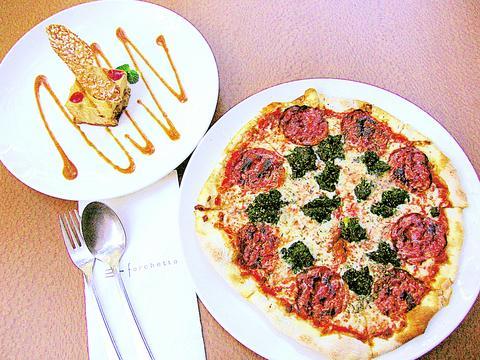Over the past six months, Max Tseng (
A veteran of the kitchens of Haoyang (

PHOTO: GAVIN PHIPPS, TAIPEI TIMES
And with the summer weather settling in, the simple and well-ventilated dinning area is a real treat. Max's design includes a huge glass facade, which, when fully open, gives the already spacious joint an even greater sense of space.
The dining environment is a major draw, but the food certainly cannot be ignored. A combination of Italian and Spanish with a bit of French, the dishes on the menu might not be as numerous as other European-styled joints, but for presentation and taste, Forchetta outclasses many, if not all, its rivals.
Forchetta's range of tapas include Spanish-style bread (NT$100), asparagus wrapped with Parma ham and Dijon pommary (NT$150), and roasted foie gras with fig sauce (NT$380). While a bit costlier than the average starter, Forchetta's Bufalo mozzarella with tomatoes (NT$360) is well worth the extra cost, especially when you consider that Max imports the cheese especially for this dish.
At present, Forchetta's pasta dishes are somewhat limited, with most of the half-dozen choices topped with seafood. These include linguini with crab and mushroom sauce (NT$260), penne with anchovies and olives (NT$260) and linguini with clam and white wine sauce (NT$260). According to Max, the pasta menu is set to change some time in the coming weeks when he plans to add new dishes to the pasta menu.
While the tapas and pasta dishes are faultless, it's Max's mouth-watering pizzas that have tongues wagging. The secret to Max's pizza is the crust. Not greasy, not soggy, and certainly not chewy.
Forchetta's pizza combinations include the absolutely fantastic spinach, salami, gorgonzola and mozzarella (NT$380) and the equally tasty, yet saucily spicy sausage, mushroom and mozzarella (NT$320). For cheese lovers, the gorgonzola, brie, ricotta and mozzarella (NT$380) comes highly recommended.
For those out to wine as well as dine, Forchetta offers a variety of both Old and New World wines, all of which are reasonably priced at between NT$700 and NT$1,500 as well as a good choice of bottled European beers at NT$170 a pop.

April 14 to April 20 In March 1947, Sising Katadrepan urged the government to drop the “high mountain people” (高山族) designation for Indigenous Taiwanese and refer to them as “Taiwan people” (台灣族). He considered the term derogatory, arguing that it made them sound like animals. The Taiwan Provincial Government agreed to stop using the term, stating that Indigenous Taiwanese suffered all sorts of discrimination and oppression under the Japanese and were forced to live in the mountains as outsiders to society. Now, under the new regime, they would be seen as equals, thus they should be henceforth

Last week, the the National Immigration Agency (NIA) told the legislature that more than 10,000 naturalized Taiwanese citizens from the People’s Republic of China (PRC) risked having their citizenship revoked if they failed to provide proof that they had renounced their Chinese household registration within the next three months. Renunciation is required under the Act Governing Relations Between the People of the Taiwan Area and the Mainland Area (臺灣地區與大陸地區人民關係條例), as amended in 2004, though it was only a legal requirement after 2000. Prior to that, it had been only an administrative requirement since the Nationality Act (國籍法) was established in

Three big changes have transformed the landscape of Taiwan’s local patronage factions: Increasing Democratic Progressive Party (DPP) involvement, rising new factions and the Chinese Nationalist Party’s (KMT) significantly weakened control. GREEN FACTIONS It is said that “south of the Zhuoshui River (濁水溪), there is no blue-green divide,” meaning that from Yunlin County south there is no difference between KMT and DPP politicians. This is not always true, but there is more than a grain of truth to it. Traditionally, DPP factions are viewed as national entities, with their primary function to secure plum positions in the party and government. This is not unusual

US President Donald Trump’s bid to take back control of the Panama Canal has put his counterpart Jose Raul Mulino in a difficult position and revived fears in the Central American country that US military bases will return. After Trump vowed to reclaim the interoceanic waterway from Chinese influence, US Defense Secretary Pete Hegseth signed an agreement with the Mulino administration last week for the US to deploy troops in areas adjacent to the canal. For more than two decades, after handing over control of the strategically vital waterway to Panama in 1999 and dismantling the bases that protected it, Washington has